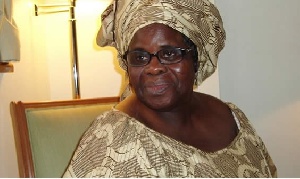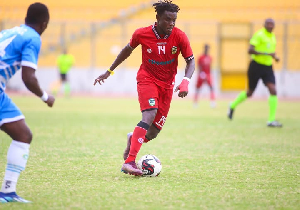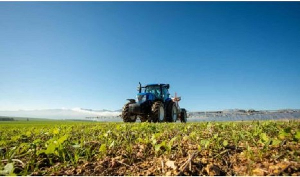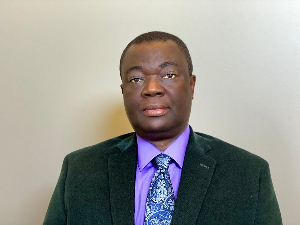The lead front-page story in the Ghanaian Times of Monday, September 5 was “Poet Laureate Storms Out of Event…Over wrong spelling of her name.”
Regulars on social media had already started discussing the matter the day before when Ms. Kinna Likimani, the daughter of Prof. Ama Ata Aidoo (the poet laureate), posted the news, which went viral on Facebook.
I, like many people in this country, hold Prof. Ama Ata Aidoo in high esteem not least because there are precious few internationally-recognised female writers from this country.
I also respect her as someone who has stood up for the notion of equality and the rights of marginalised groups, including women and young people. It was for this reason that as part of the 10th anniversary celebrations of the Centre for Gender Studies and Advocacy (CEGENSA) at the University of Ghana, she was amongst a select group of other female achievers singled out for honour.
Last Saturday’s award event at which a banner and programme heading contained a misprint of Prof. Ama Ata Aidoo’s name was meant to both celebrate her achievements and affirm her as a role model for young aspiring writers from her alma mater – the University of Ghana.
For those unfamiliar with CEGENSA, let me briefly state it was established to support the University community as well as the larger public through teaching, research and advocacy on gender-related issues.
The Centre has developed, and now successfully teaches, a mandatory undergraduate course on gender at the University. It was also the driving force behind the sexual harassment policy currently in place at Legon, a policy which many other institutions in this country could learn from.
Those who care to dig beneath the surface of controversy would also find useful policy research on key gender and development issues at CEGENSA, including a recent comparative study on domestic violence and the state of protection services for DV survivors.
I point out the bona fides of the Centre not to excuse the misspelling on the banner and in the programme heading, but to simply provide information on a little known centre caught in the eye of a public storm and now defined by the unfortunate incident for people who had never heard of it or know very little about what it does.
I have read several comments suggesting the Centre did not know the correct spelling of its honoree’s name and had disrespected her by getting the spelling wrong. Nothing could be further from the truth.
CEGENSA does know how to spell Prof. Ama Ata Aidoo’s name and is very familiar with her work. In all other correspondence with her and her foundation Mbaasem, before and during the planning of the competition, the Centre got the spelling right.
I was not part of the team which organized the event but I was there that day and was told the misspelling had resulted from the printers who had erroneously assumed (probably because of the dominant spelling of that name) that what had been submitted to them – Ata – was wrong and so had added the extra ‘t.’
Still, there is little doubt responsibility for the mistake lies with the Centre because having at the last minute discovered the misprint they should not have used the banner or programme, despite the expense they had gone through to print them. I teach journalism and drum in the ears of my students that misspelling names is unacceptable. This incident was a useful case study to share with them in my Monday class.
To be fair, the organisers of the event immediately owned up to the mistake and accepted responsibility right there at the venue when Prof. Ata Aidoo expressed outrage. They apologized profusely and went as far as kneeling down to beg, a sign of contrition in our culture.
Unfortunately that did not prevent the honoree from walking out on the event, nor did it stop her daughter from posting the incident on Facebook in what has turned out to be a public shaming of CEGENSA.
Ms. Likimani’s Facebook post sought to further tarnish the image of the Centre by incorrectly claiming the brochure had her mother’s birth year wrong. To that I take exception.
The birth year in the programme brochure was 1940. It is a matter of public record that there is some confusion about the year of birth of Prof Ama Ata Aidoo. As noted in the book Essays in Honour of Ama Ata Aidoo at 70, edited by Anne Adams, her year of birth is published in a “majority of literary-biographical sources” as 1942 although “from knowledge gained since and through a few other sources – Ama Ata herself being not the least among them – 1940 had to be conceded as the birth year.”
Ms. Likimani herself announced in her post that “at 76 years Ama Ata Aidoo, after 60 years writing, publishing and teaching, will walk out.” We are in the year 2016. Do the math for yourself.
But as Ms. Likimani stated in her post the misspelling of her mother’s name appears to be a “uniquely Ghanaian problem” which her mother has been “battling for a while.” And so I guess this was an opportunity to wage a public battle; the last stand as it were.
I can understand the frustration for constantly having to correct people who ought to know better on the spelling of your name. I do not think Prof. Ama Ata Aidoo is wrong in taking a public stand on this matter.
The issue, in my view, is where, and how, and against whom, and at whose expense, this much admired progressive socialist feminist and her daughter chose to do battle. Indeed I am unsure the battle has been won at all and, if it has, it is at best a pyrrhic victory; a victory in which the victors have certainly suffered as great a loss as those they defeated. And here is why.
By walking out on the event the salacious became the news. The personal slight and retribution attracted far more media attention than the fact that a successful writing competition had been organized in honour of Prof. Ama Ata Aidoo, and that it had attracted as many as 75 entries, despite commonly expressed anxieties that young people no longer read, let alone write.
The Facebook commentators, some of whom often bemoan the trivialities in the media, remained firmly disinterested in this good news even when confronted with it, preferring to continue to dwell on that extra ‘t’ and how it represented the worst form of mediocrity and sloppiness in our country. By walking into that African Regency Hall and then walking out to press home the point to organisers that their ‘sloppiness’ would not be tolerated, Prof. Ama Ata Aidoo wound up walking out on the 75 University of Ghana students who were inspired by her and the opportunity CEGENSA had given them, to showcase their writing talent.
By choosing not to be magnanimous to her allies in the feminist struggle during their moment of weakness, she also let down the five top winners, all female, who were looking forward to having a conversation with her about their work and perhaps hoping that, true to Mbaasem’s vision of mentoring young female writers, they too could become her mentees.
Finally, walking out meant she missed the reading of “Bean Cake,” the winning short story by Nana Yaa Asantewaa Asante-Darko, a final year student at the University of Ghana Business School.
It was a tale of child marriage and kayayee so cleverly crafted and written in such a riveting manner it left the audience on the edge of their seats when extracts were read at the event.
Oh how I so wish we could all see the forest for the tress and that it was “Bean Cake” that had gone viral on Facebook. Or “Noon,” the second winning story on albinism by Margaret Adomako, which judges had described as an African Cinderella story.
Or “Fear of the Ring” by Ruthfirst Eva Ayande, which brought together the themes of feminism, artificial insemination, career women and witchcraft. Or “Rima” by Sarah Faakor Toseafa, about a young girl who became a rapper.
Or “The Last Girl Cut,” submitted by Awo Aba Odua Gyan, which had impressed reviewers because of how the young writer had used humour to address the harrowing experience of Female Genital Mutilation.
Opinions of Saturday, 17 September 2016
Columnist: Audrey Gadzekpo



![IGP Tetteh Yohuno [M] seated with some former IGPs IGP Tetteh Yohuno [M] seated with some former IGPs](https://cdn.ghanaweb.com/imagelib/pics/445/44589177.295.jpg)











